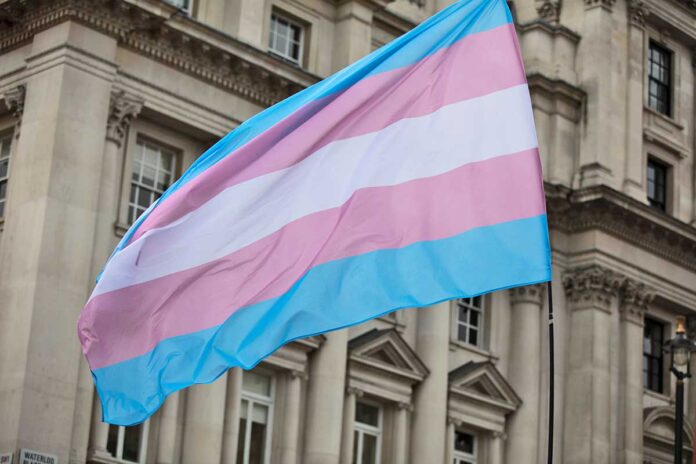There are three stories that have recently passed my desk, each of which are unrelated, but together paint a very descriptive image of what’s wrong with the way non-trans people are speaking about trans lives.
First, the North Dakota GOP asked its members to vote on 15 resolutions during its convention, with all but a proposed push for criminal penalties for women who get abortions passing. The other 14 covered a wide array of topics, from fighting against the use of eminent domain for carbon capture to demanding the United States withdraw from the United Nations.
The resolution that caught my eye was neither of those, but one that opposed adding sexual orientation and gender identity as a protected class within the Peace Garden State. Of particular note was their language aimed at transgender and nonbinary people.
“The North Dakota Republican Party advocates an affirming approach to biological identity and supports the restoration of gender dysphoric individuals, that they may embrace and be comfortable with their natural biological state.”
Let’s sit with that a moment, and focus a hemisphere away, from North Dakota to Vatican City.
After a few years of somewhat positive news, including a statement that transgender people could be baptized “under certain conditions,” the Dicastery for the Doctrine of the Faith released the Dignitas Infinita (Infinite Dignity). The 20-page document, which spelled out the Catholic Church’s stance on “gender theory,” declaring that to be transgender is to try to “make oneself God.”
As you can guess, the church prefers to keep who is and isn’t a deity firmly in their own hands.
“It follows that any sex-change intervention, as a rule, risks threatening the unique dignity the person has received from the moment of conception,” said the Dicastery for the Doctrine of the Faith within the Dignitas Infinita.
Finally, a visit to jolly old England, where a Review was commissioned with a goal of improving gender identity services under the National Health. The report is widely known as the Cass report, from the name of its author, Dr. Hilary Cass.
Rather than looking to improve transgender care in the UK, and in spite of large criticisms about impossible wait times and substandard treatment, the report instead calls for even more restrictions on transgender care for transgender people under the age of 25, but stops short of a complete ban on transgender care.
It also suggests that conversion therapy may be a viable option for transgender people, and even expects one to see a clinician before even undergoing social transition.
In it, Cass claims that people are somehow “influenced” into being transgender, and that being transgender itself may cause anxiety and depression. It also dismissed 98% of the existing studies on transgender healthcare as invalid, simply because they weren’t “double-blinded.” Never mind that doing so would be ethically impossible to carry out.
It is obvious that each of the above is about transgender people, but I also want to point out the obvious issue with them all: it is clear that there is not a trans voice in any of the above.
The Cass report is obvious. Not only did they dismiss any report that shows how trans care has positively affected actual transgender people, but they did not even bother to include trans voices in their report. The voices of transgender youth — the very people they were seeking to help, supposedly — were tossed out for being somehow “biased” in discussing our own care.
If they had listened, the argument of “influence” would fall away, let alone the notion that being trans itself leads to depression and anxiety: it’s not being trans that does that, it is how we, as transgender people, are treated by society.
Likewise, the Dignitas Infinita talks a lot about dignity — it is right there in the title — all the while it denies transgender people their own dignity in the eyes of their God. We’re not seeking to be their God. We just want to be allowed to be human.
They couch us as some sort of “theory,” when we are flesh and blood. Once again, we’re humans, we walk among you. You can talk to us. Yet, rather than seeing our dignity and, yes, the spark of the divine that they might otherwise claim to possess, they treat us as undignified at best — and something bordering on heresy at worst.
And then there is the North Dakota GOP.
We don’t need much prompting to know the GOP stance on transgender people. The party has been making it clear, in words and action, that they would rather see transgender people eradicated, even as they too try to hide behind phrases like “gender ideology,” or “pronouns,” or whatnot.
To that end, I want to note the one thing that bothers me the most about their statement. They seem to want me to “embrace and be comfortable with [my] natural biological state.”
This is my “natural biological state.”
In spite of the fact that my biology is distinctly different from what they may be expecting after three decades of medical intervention of one sort or another, I also know that I am exactly who I always knew I was, from about age three onward. I am indeed embracing and comfortable with who I happen to be, and if you had bothered to talk to a transgender person, maybe you’d have the slightest glimmer of that.
No amount of conversion therapy, no amount of repression, and no number of ridiculous reports, dirtiness, or resolutions can change who a transgender person is — and we expect that to be honored.
That’s our dignity speaking, and you aren’t allowed to write it off.
Gwen Smith never became transgender, she just is. You can find her at www.gwensmith.com.
